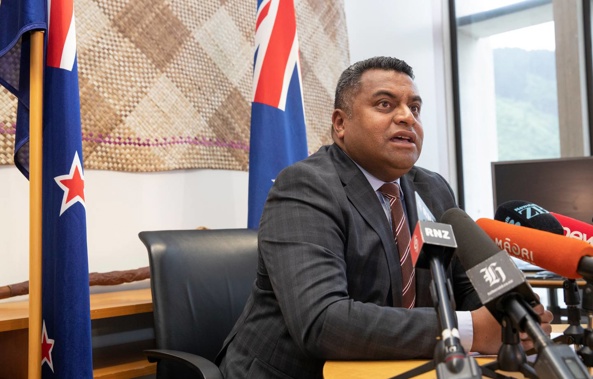
The Government wants to strengthen its powers to prevent a terrorist act and widen the definition to include inducing fear - which might capture incidents like sending a pig's head to a mosque.
Justice Minister Kris Faafoi held a press conference this afternoon to unveil a new bill that the Government has introduced to strengthen how it can respond to threats of terrorism.
The Counter-Terrorism Legislation Bill follows the Royal Commission into the March 15 terrorist attack, which made a series of recommendations to fill gaps in the existing law.
Justice Minister Kris Faafoi said the changes in the bill would not have prevented the March 15 attacks, but they would enable agencies to act in a more efficient and practical way - including against an individual.
Asked if the current law did not enable agencies to act against an individual planning an act of terrorism, he said that was his understanding.
That would mean the current framework would have restricted agencies from acting if they had uncovered Brenton Tarrant's March 15 plans before he enacted them - though Faafoi said he would not comment on individual cases.
The bill has already been flagged as aligning with inquiry recommendations, including:
- making amendments to clarify the definition of a "terrorist act";
• creating a new offence to criminalise planning or preparation for a terrorist act;
• creating a new offence to more clearly criminalise terrorist weapons and combat training;
• extending the eligibility for a control order to include individuals who have completed a prison sentence for a terrorism-related offence if they continue to present a real risk of engaging in terrorism-related activities.
The bill also includes proposals that Cabinet has already agreed to including:
- creating a new offence for international travel to carry out terrorist activities;
• expanding the criminal offence of financing terrorism to include broader forms of material support.
The new definition of a terrorist act is one that advances "an ideological, political, or religious cause" carried out to induce "fear in a population", rather than simply "terror in a civilian population".
Faafoi said he didn't think the new definition was too wide, and wouldn't be drawn on whether sending a pig's head to a mosque - which happened in 2016 - would be seen as a terrorist act under the bill.
He added that it would be up to police to determine whether the threshold was met under the new bill, and the justice select committee would consider whether the new definition was too wide.
The current law was designed to counter major terrorist groups, and the bill was the first step towards implementing the recommendation to review all legislation related to New Zealand's counter-terrorism effort to ensure it is fit-for-purpose.
"The crimes perpetrated against members of our Muslim community on March 15 two years ago brought terrorism to this country in a way we had never seen before," Faafoi said.
"The attack also mirrored how the nature of terrorism has been changing internationally, involving lone actors rather than organised terrorist groups. We need to ensure our laws can respond to that."
Prime Minister Jacinda Ardern said she did not have concerns about whether it would widen agencies' ability to snoop on minority groups, saying the changes were in line with the Royal Commission's report.
Justice Minister Kris Faafoi announcing the Government has introduced the Counter-Terrorism Legislation Bill. Photo / Mark Mitchell
Act leader David Seymour questioned why a bill was needed when Faafoi said it wouldn't have prevented the March 15 shootings, adding that the current law - and other laws - would have enabled authorities to prosecute Tarrant for planning March 15, if only they had been looking in the right places.
The commission's report, released in December, found that Brenton Tarrant was able to plot, amass an arsenal of weapons, and execute his deadly attack without drawing the attention of security agencies, which had deployed "an inappropriate concentration of resources" probing Islamic extremism.
Prime Minister Jacinda Ardern and Police Commissioner Andrew Coster have apologised for the failings.
But the commission found that nothing could have been done to have stopped the March 15, 2019, attacks, which left 51 Muslims dead, and were not the result of failures by public sector agencies involved in New Zealand's counter-terrorism effort.
Take your Radio, Podcasts and Music with you









